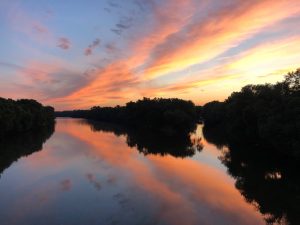Read the Monacan Indian Nation’s Public Statement of Gratitude Upon Successful Resolution of the Fight to Save Rassawek
PALMYRA, VA – March 16, 2022 – The Monacan Indian Nation today celebrates the selection of an alternative route for the construction of the James River Water Authority (JRWA) water withdrawal and pipeline, which will avoid destroying the Monacan historic capital of Rassawek.
In 2017 JRWA, a joint initiative of Fluvanna and Louisa counties, announced without consulting the Nation that it would develop its project on and thereby destroy a site first documented by Captain John Smith in 1612 as “the  chiefest town” in the Monacan territory, which covered half of what is today Virginia. Monacans occupied Rassawek through 200 generations, beginning 4,730 years ago. Beginning in the 1880s, the Smithsonian documented the important archaeological resources and extensive human burials at Rassawek.
chiefest town” in the Monacan territory, which covered half of what is today Virginia. Monacans occupied Rassawek through 200 generations, beginning 4,730 years ago. Beginning in the 1880s, the Smithsonian documented the important archaeological resources and extensive human burials at Rassawek.
The resulting highly contentious four-year battle had drawn national attention and the involvement of tens of thousands of private citizens and organizations representing millions of American Indians and historic preservationists.
In 2020, the Commonwealth disqualified JRWA’s archaeologist and the Nation filed a 1,124-page document with the Army Corps of Engineers asserting multiple legal arguments why the project should not be permitted. Soon after, the National Trust for Historic Preservation named Rassawek to its annual list of the country’s 11 Most Endangered historic sites. JRWA took a pause. They consented to hire archaeologists trusted by the Nation, and the resulting investigative report, turned in last week, showed little risk of encountering ancestral remains on “Alternative 1C.” Holding up its end of their proposed bargain, this morning the Nation provided JRWA a letter officially supporting the project at the alternative site. JRWA, which for years insisted that no viable siting alternatives existed, this morning voted unanimously to abandon their plans in favor of building on an alternative route two miles from Rassawek.
Monacan Tribal Chief Kenneth Branham proclaimed, “This fight has been long and hard, but we are filled with joy to see Rassawek preserved and our ancestors respected. We have always said, if we can’t save Rassawek, there’s nowhere in Virginia that’s safe. And indeed, this is a victory not just for the Monacans, but for all Virginians.” The Nation has issued a “Public Statement of Gratitude” thanking a broad and diverse coalition of allies who contributed to the favorable outcome.
National Congress of American Indians President Fawn Sharp observed that the ripples of the victory at Rassawek may travel far beyond the Commonwealth: “Tribes have unique knowledge of and connection to historic and sacred sites like Rassawek, and tribal input must be heard on projects that affect their ancestral land. NCAI is proud to stand with the Monacan people and believes their path to this outcome will become a new model for foiling threats to Native history across the country.”
U.S. Senator Tim Kaine (D-VA), who has assisted the tribe’s efforts and this summer landed his canoe at Rassawek, which is situated on a peninsula at the confluence of James and Rivanna rivers, stated: “I am glad that all sides were able to find a resolution that spares the ancient burial grounds at Rassawek from development. I know from visiting Rassawek with Chief Branham that this site is a one of a kind Virginia historic treasure.”
The law firm Cultural Heritage Partners, led by Greg Werkheiser and Marion Werkheiser, provided pro bono counsel to the Nation throughout the battle and now serves as general counsel for six of the seven federally recognized tribes in Virginia. Greg observed, “Too frequently developers, private and public, pit communities against one another in a false choice between ‘progress’ and preservation—but look here: these counties will get their water and protect a wealth of cultural heritage.”
The Monacan Indian Nation is grateful to the National Trust for Historic Preservation and Preservation Virginia for their nominations of Rassawek, and for all the supporters who have expressed concerns about the site or participated in advocacy. But we still need action to #SaveRassawek!
For more resources and coverage on the multi year fight to save Rassawek you can go here.